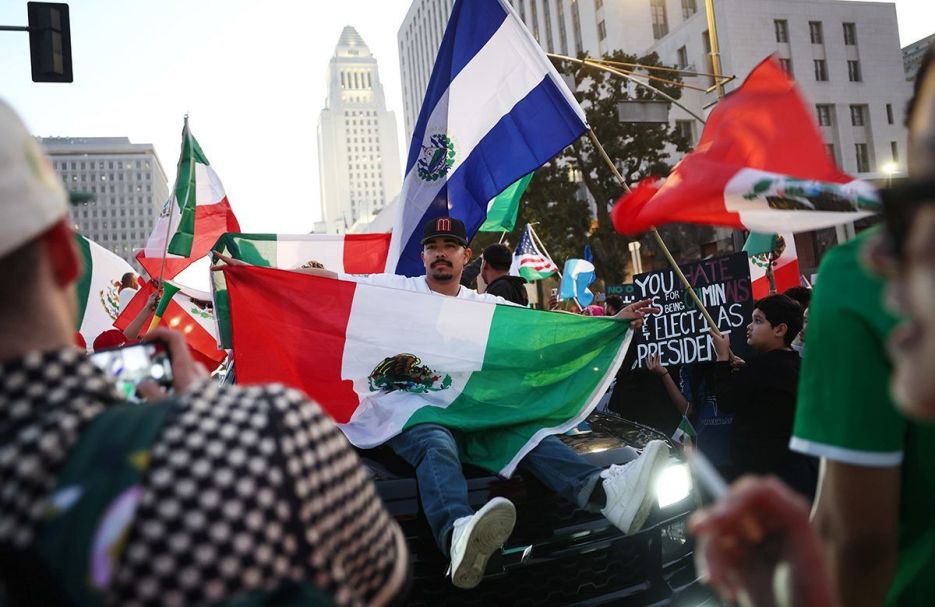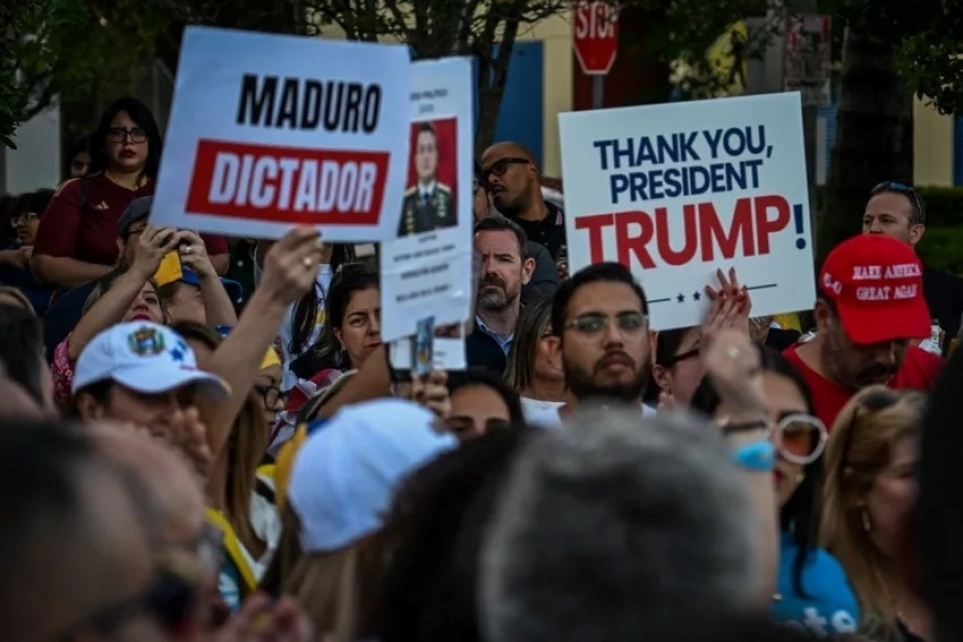Samuel Rodríguez: los latinos no deben tener "miedo ni angustia" por las políticas migratorias de Trump

Un destacado pastor evangélico hispano está intentando asegurar a la comunidad latina que no tienen nada que temer de las nuevas políticas de inmigración de la administración Trump mientras los líderes de la iglesia debaten el impacto de los esfuerzos para acabar con la inmigración ilegal y el fraude de asilo.
[Estamos en WhatsApp. Empieza a seguirnos ahora]
Poco después de asumir el cargo el 20 de enero, la administración Trump implementó una rescisión de la política de “Protección de ubicaciones sensibles” que limitaba la capacidad de los funcionarios federales encargados de hacer cumplir la ley de inmigración de tomar medidas para deportar a inmigrantes ilegales en o cerca de áreas “sensibles”. “Los criminales ya no podrán esconderse en las escuelas e iglesias de Estados Unidos para evitar ser arrestados”, dijo un portavoz del Departamento de Seguridad Nacional de Estados Unidos en una declaración sobre el cambio de política.
El pastor Samuel Rodríguez, presidente de la Conferencia Nacional de Liderazgo Cristiano Hispano (NHCLC), dijo a The Christian Post que ha “recibido múltiples garantías y aclaraciones sobre la motivación detrás de eso”. Señaló que es parte de un esfuerzo para apuntar a los inmigrantes ilegales criminales y garantizar que “no haya ningún espacio seguro para que los criminales puedan esconderse, incluidas iglesias, hospitales y escuelas”.
“En los últimos 250 años de historia de Estados Unidos, bajo ninguna circunstancia ha habido un momento en que tropas federales hayan entrado con armas de fuego a una iglesia. Y no sucederá bajo la administración Trump”, prometió. “No preveo ninguna circunstancia en la que agentes de Inmigración y Control de Aduanas en cooperación con otras agencias de aplicación de la ley disparen con armas de fuego en un servicio de domingo por la mañana”.
Rodríguez reiteró que “las iglesias son un espacio sagrado, un lugar sagrado, una tierra santa para los feligreses, y no debería haber ningún temor o angustia por parte de la comunidad inmigrante, o cualquier comunidad, cualquier grupo de nuestro panorama demográfico, en lo que respecta a si pueden adorar sin ningún temor”.
Rodríguez atribuyó las preocupaciones sobre la nueva política en la comunidad latina a la “desinformación”, que dijo que los líderes de la iglesia estaban trabajando para abordar.
Sin embargo, advirtió que “si hay personas inocentes, inocentes con la excepción de haber entrado aquí ilegalmente, pero que nunca han cometido un delito, ni siquiera han tenido una multa de estacionamiento, pero están cerca, en la misma habitación, en la misma casa… con un grupo de personas que están involucradas en el crimen, cuando los criminales son deportados, existe una buena posibilidad de que, de la misma manera, sean deportados”.
Al describir las tácticas de los agentes del ICE, agregó: “No van a entrar en las iglesias, pero podrían estar fuera del área del estacionamiento. No en el estacionamiento, sino afuera, en las instalaciones, fuera de la propiedad de la iglesia, buscando ese elemento criminal que tal vez salga de un servicio religioso, ese pandillero o esa persona que tiene antecedentes. Esa es una posibilidad”.
Rodríguez agregó que está enfatizando a la comunidad migrante que “si no eres un criminal y eres un inmigrante arraigado, has estado aquí por 10, 15, 25, 30 años y tus hijos nacieron y crecieron aquí, no eres el objetivo principal de ICE [...] o incluso de otras agencias de aplicación de la ley que se están asociando con ICE”.
Rodríguez también se refirió a la suspensión temporal del reasentamiento de refugiados, que algunas organizaciones evangélicas han condenado.
“El asilo de nuestro actual sistema de inmigración roto tenía tantas lagunas, exacerbadas por cuatro años de mala gestión, que la administración Trump está poniendo una suspensión temporal”, dijo Rodríguez. “Esto no es permanente. La administración ha declarado que es una suspensión temporal hasta que arreglen las lagunas. Debido a que el nivel de investigación, la veracidad de la información proporcionada fue tan mínima que muy pocos elementos pudieron confirmarse”.
“Hubo tantas lagunas que surgieron en los últimos años que básicamente cualquier persona de cualquier lugar puede solicitar asilo por cualquier motivo, por cualquier razón”, agregó Rodríguez. “Todo lo que tienes que decir es, ‘Estoy sufriendo persecución en mi ciudad’ sin ninguna especificidad”. Como ejemplo, dijo que otra frase genérica común utilizada por los solicitantes de asilo es, “alguien me está siguiendo”.
“Es ese tipo de ambigüedad y laguna jurídica lo que está impulsando a la administración Trump a poner un alto a esto hasta que lo solucionemos”, concluyó. Rodríguez estuvo entre varios líderes evangélicos que recientemente se reunieron para discutir las políticas de inmigración de la administración y el papel de la iglesia estadounidense en el futuro.
Daniel Garza, de la Iniciativa Libre, quien asistió al evento, dijo a CP que “el presidente Trump está enviando un mensaje claro. Está cambiando drásticamente la forma en que Estados Unidos defenderá su frontera y garantizará que se realice una investigación adecuada de quienes buscan venir a Estados Unidos como inmigrantes”.
Jennifer Korn, asesora principal de la Junta Asesora Nacional de Fe, contrastó las acciones de Trump con lo que llamó “la anarquía de los últimos cuatro años”. Según Korn, “el presidente Trump está haciendo lo que el pueblo estadounidense lo eligió para hacer, incluidos los latinos y las personas de fe. Está a favor de mantenernos seguros, asegurar la frontera y ha hablado de una gran y hermosa puerta para permitir la inmigración legal. Solo necesitamos saber quiénes son esas personas”.
“La gente también necesita saber que ICE no está apuntando a ‘lugares sensibles’ como escuelas, tribunales o instituciones religiosas”, enfatizó. “Lo que ha cambiado es que los funcionarios de ICE ya no tienen prohibido el acceso a estos lugares si la situación se considera apropiada y es aprobada por un supervisor de segunda línea”.
El obispo Gary Lewis, supervisor general de la Iglesia de Dios, sostuvo que “lo principal que hay que abordar es el miedo”.
Lewis dijo que apoya la persecución de quienes están en el país ilegalmente y han cometido delitos violentos, al tiempo que destacó que, para otros que respetan la ley y contribuyen de manera positiva a la sociedad, se debe mostrar “compasión”.
“Estas familias arraigadas son cruciales para nuestras comunidades y partes vitales de nuestra iglesia. Nuestro objetivo tiene que ser tranquilizar a nuestros electores de que no van a allanar su congregación un domingo por la mañana. Esa no es la dirección que esto va a tomar”.
No todos en la comunidad religiosa están elogiando el manejo de Trump del problema de la inmigración ilegal hasta ahora.
En una declaración publicada el martes pasado, Bruno Molina, director ejecutivo de la Red Nacional Bautista Hispana, insistió en que “como red de líderes del ministerio hispano, reconocemos la necesidad de la seguridad de nuestras comunidades”.
“Al mismo tiempo”, agregó, “esperamos que el gobierno respete la libertad religiosa de una iglesia para ministrar a su comunidad y mantener la santidad de sus espacios de culto”.
“Nuestras iglesias son espacios acogedores donde se anima a todos a experimentar la gracia de Dios y arrepentirse de sus pecados”, agregó Molina. “Nos duele profundamente que nuestras iglesias ya no estén protegidas y que a alguien se le niegue la oportunidad de recibir orientación espiritual en nuestras iglesias por miedo a ser arrestado”.
Molina instó al DHS a restablecer las “Protecciones para lugares sensibles” para las iglesias, considerando que tal medida es necesaria para “cumplir con nuestra misión dada por Dios de ministrar a los más pequeños y a los extranjeros entre nosotros”.




















